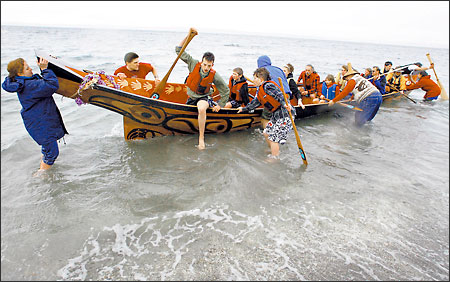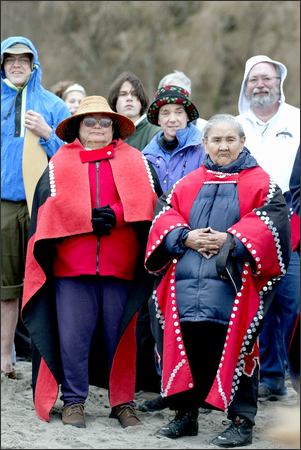|
|
Canku Ota |
|
|
(Many Paths) |
||
|
An Online Newsletter Celebrating Native America |
||
|
March 6, 2004 - Issue 108 |
||
|
|
||
|
Students Help
Carve a Bit of History |
||
|
by Debera Carlton Harrell -
Seattle (WA) Post-Intelligencer
Reporter
|
||
|
credits: photo
1: Three years after starting the project, students of Alternative
School No. 1 near Northgate and volunteers took their first paddle
in the "Ocean Spirit" canoe they carved from a 750-year-old
red cedar log. The 40-foot canoe, which will become a gift to the
Haida Nation in Alaska, will be on display at the Seattle School
Board Building until mid-March. (February 25, 2004) photo 2: abel
Norris, left, and Stella Monsegur, of the Haida Laas dance group,
watch the launch of the "Ocean Spirit." All Photos by:
Meryl Schenker/Seattle Post-Intelligencer{credits}
|
|
Christened
with leis, conch shells, eagle feathers and tribal chanting, the
red cedar log turned Haida canoe earned its name as it was launched
bow-first into a south wind and the choppy waves of Puget Sound.
Carver Robert Peele was moved to tears. "This canoe carries the spirit of all living things," Peele said. "Today, we honor Ocean Spirit, we honor our families. ... Respect for all tribes -- all must be honored here. Putting aside differences is healing." The journey from Weyerhaeuser forest land to the sea was not an easy one, Peele said, but the canoe project came together despite challenges, technical and otherwise. It took three tries to steam and stretch out the interior of the 14,000-pound canoe, using 2,000 pounds of heated volcanic rock. The work was performed largely in the parking lot of Seattle Public School's Alternative School No. 1, near Northgate. Peele, whose Haida name is Saaduuts, said the canoe's detailed symbolism is part of its spirit. The black-painted eagle design at the canoe's stern and the raven at the bow represent the spirits of his mother and father, he said. Gold-painted hands along the inside rim of the craft -- the handprints of children and adults who worked on the canoe -- represent "reaching out and caring," Peele said. "It
was a lot of work," said Harry Snyder, 15, a student and one
of the estimated 200 students and volunteers who helped transform
the 750-year-old tree, donated by Weyerhaeuser from British Columbia
land Peele said was once owned by the Haida people. The hard work and long hours were worth it, Snyder said. "To finally paddle it, to see it float -- it was an exhilarating experience," he said, beaming. "I'm really proud of it." Karl Vollan, a student teacher at the school when Peele began teaching native and non-native students about carving, said the experience changed "a lot of lives." "This project helped in so many ways," Vollan said. "Kids spent many a rainy day working on this, but then came the day when 'the log' became 'the canoe.' I remember one kid who was suspended every other day, didn't have many friends, who began working on this canoe, and his life turned around. He stopped getting into trouble." For members of several Puget Sound-area tribes, the day was also one of honoring one another. Marilyn Jones, director of the Suquamish Museum, thanked everyone for "keeping our canoe culture alive." Jones' husband, Gene Jones, 60, a elder of the S'Klallam tribe, was a drummer and speaker yesterday, hugging Peele and others as the canoe was launched. His grandfather was a carver, and Gene Jones recalled seeing launches as a youth. "My grandfather said no matter what, any time a canoe is being born, we should be there," he said. "This
is a magnificent canoe." P-I reporter Debera Carlton Harrell can be reached at 206-448-8326 or deberaharrell@seattlepi.com |
|
|
www.expedia.com |
|
|
||
|
|
||
| Canku Ota is a free Newsletter celebrating Native America, its traditions and accomplishments . We do not provide subscriber or visitor names to anyone. Some articles presented in Canku Ota may contain copyright material. We have received appropriate permissions for republishing any articles. Material appearing here is distributed without profit or monetary gain to those who have expressed an interest. This is in accordance with Title 17 U.S.C. Section 107. | ||
|
Canku Ota is a copyright © 2000, 2001, 2002, 2003, 2004 of Vicki Lockard and Paul Barry. |
||
 |
 |
|
|
The "Canku Ota - A Newsletter Celebrating Native America" web site and its design is the |
||
|
Copyright © 1999, 2000, 2001, 2002, 2003, 2004 of Paul C. Barry. |
||
|
All Rights Reserved. |
||
 It
took many hands to carve Ocean Spirit the past three years, and
many yesterday to clap, beat drums and carry it to the shore's edge.
It
took many hands to carve Ocean Spirit the past three years, and
many yesterday to clap, beat drums and carry it to the shore's edge. The
log, donated for educational purposes, will ultimately wind up in
tribal hands; the canoe will head to Hydaburg, Alaska, in April
after a two-week display at Seattle Public Schools' headquarters.
The
log, donated for educational purposes, will ultimately wind up in
tribal hands; the canoe will head to Hydaburg, Alaska, in April
after a two-week display at Seattle Public Schools' headquarters.